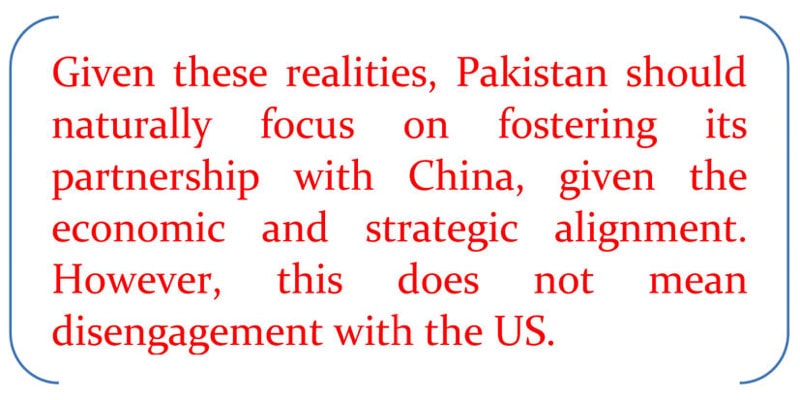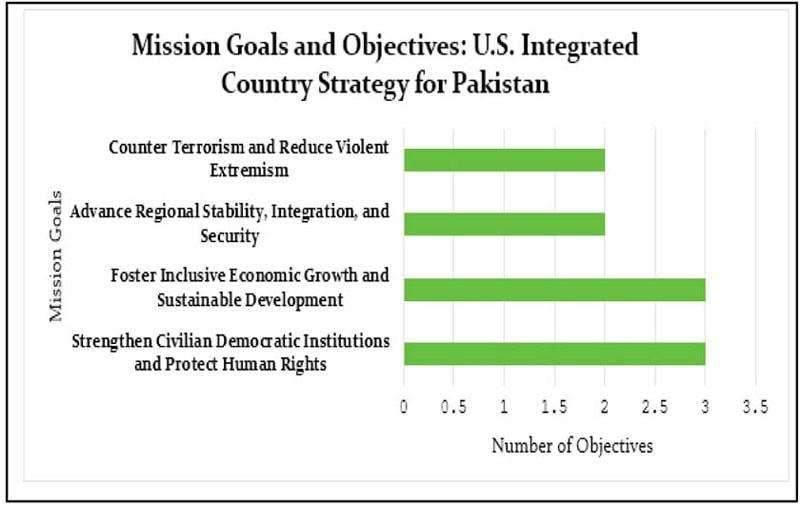This insight discusses the position of the United States (US) and China on Pakistan’s national security interests derived from the National Security Policy of Pakistan (NSP) 2022-26, in the backdrop of their rivalry, and proposes a way forward for Pakistan.
According to the NSP, Pakistan’s security interests in the next decade will be driven by the urgent need to realise its significant economic potential. This ensures national cohesion, territorial integrity, internal security, and citizen welfare.
The ongoing strategic competition between the US and China significantly impacts Pakistan’s security calculus. The US has aimed to counter China’s influence through alliances and economic partnerships, particularly with India in Asia. This has led to a complex situation for Pakistan, as it must navigate its relationships with the US and China to ensure its security and economic interests. Through the Belt and Road Initiative (BRI), China seeks to enhance regional connectivity and economic interdependence and advance its strategic foothold, potentially benefiting Pakistan’s economic strategies but posing security challenges.
For Pakistan, the question is how to pursue its interests and avoid negative consequences safely. This question becomes even more critical considering that on some of Pakistan’s fundamental interests, the positions of the US and China are starkly different, if not directly opposite.
Economic security is a primary concern for Pakistan as it aims to improve transnational trade and connectivity, mainly through initiatives like the China-Pakistan Economic Corridor (CPEC), part of BRI. Additionally, transnational projects such as the Iran-Pakistan gas pipeline are critical for securing Pakistan’s energy needs and boosting economic development.
While the US has provided aid and supported development initiatives in Pakistan through the United States Educational Foundation in Pakistan (USEFP) and other organisations, it has been critical of Pakistan’s close economic ties with China, mainly the CPEC. Moreover, the US views CPEC as part of China’s broader strategic ambitions, potentially undermining US influence in the region. The US has also been a critical hurdle in the completion of the Iran-Pakistan gas pipeline project.
On the other hand, China considers Pakistan a key partner in its BRI, with CPEC being a flagship project that enhances regional connectivity and economic cooperation. Moreover, China supports Pakistan’s efforts to improve infrastructure and trade linkages with regional countries, seeing this as mutually beneficial.
Furthermore, several factors, such as the ongoing instability in Afghanistan, Tehreek-e-Taliban Pakistan’s (TTP) sanctuaries in Afghanistan, tension with India over Kashmir, and other issues further necessitate Pakistan’s focus on strengthening its internal security apparatus. The US-China rivalry could potentially influence Pakistan’s national security, as both countries have their interests in the region, and their actions could impact Pakistan’s security situation.
Though the US supports Pakistan’s efforts to combat terrorism, it has also expressed concerns over Pakistan’s across-the-board handling of militant groups. Regarding India, the US has a dual approach – supporting India militarily and disregarding its aggressive activities, including direct, state-sponsored terrorism in Pakistan, the Kulbhushan Yadav case, and the targeting of certain people in Pakistan cases in point.
China monitors regional developments and supports Pakistan’s efforts to maintain internal security, combat terrorism, and ensure border stability. Although Beijing is concerned about the security of Chinese nationals and investments in Pakistan, including those related to CPEC, both nations are willing to cooperate for shared benefits.
Pakistan places significant emphasis on enhancing its defence capabilities to protect its borders and safeguard its territorial integrity and sovereignty. Undoubtedly, central to this is the resolution of the Kashmir dispute, which Pakistan advocates should be settled per the will of the Kashmiri people and United Nations resolutions. The US has historically maintained a neutral stance with a tilt towards India, advocating for a peaceful resolution of the Kashmir dispute bilaterally by Pakistan and India. On the other hand, China has traditionally supported Pakistan’s position on Kashmir, particularly at international forums like the UN, and has a vested interest in the region due to its economic and strategic ties with Pakistan.
The US has historically maintained a neutral stance with a tilt towards India, advocating for a peaceful resolution of the Kashmir dispute bilaterally by Pakistan and India. Moreover, the US often criticises Pakistan and exerts pressure on it to align against China and Russia, with no reciprocal benefits, especially concerning India’s strategic positioning.
On the other hand, China has traditionally supported Pakistan’s position on Kashmir, particularly at international forums like the UN. China also strategically supports Pakistan’s efforts to enhance its defence capabilities to protect its sovereignty.
Source: Created by the author based on US Integrated Country Strategy (ICS) Pakistan
For the welfare of its citizens, Pakistan seeks to ensure national unity and social harmony through equitable development and inclusive policies. Both the US and China support this, but their approaches differ.
The US advocates for inclusive governance and protecting minority rights in Pakistan. It has supported education, healthcare, and civil society empowerment programmes to enhance national cohesion. Washington views these efforts as critical to fostering stability and countering extremism by addressing the root causes of poverty and underdevelopment.
China views national cohesion in Pakistan as vital for the stability of the bilateral relationship, particularly given the ethnic and regional complexities in areas where CPEC projects are concentrated. It indirectly supports Pakistan’s efforts to foster unity, social harmony, and social welfare, recognising that internal stability is crucial for successfully implementing shared economic initiatives. Still, it runs no direct project or initiative related to this.
Moreover, China’s approach to social welfare in Pakistan is closely tied to its economic cooperation, particularly through CPEC. While Chinese investments are mainly focused on infrastructure, there is an understanding that improved infrastructure will indirectly benefit social welfare by boosting economic opportunities. China has also engaged in some direct welfare initiatives, specifically health and education, as part of its partnership with Pakistan.

The preceding discussion proves that while the US and China engage with Pakistan across various sectors, their approaches and objectives differ significantly, reflecting their regional strategic goals.
China’s relationship with Pakistan is deeply rooted in economic and strategic support, with no apparent public disagreements between the two nations. The CPEC, a critical project in BRI, exemplifies this partnership. The strategic collaboration, including infrastructure development, energy projects, and military cooperation, aligns with China’s regional goals and ensures mutual benefits, underscoring the depth of this relationship.
In contrast, US engagement with Pakistan focuses more on economic assistance and social development, including health, education, and capacity-building initiatives. However, some points of contention exist between the two nations, particularly concerning CPEC, the Iran-Pakistan gas pipeline, and the US strategic alignment with India. These issues reflect the broader regional dynamics, with the US prioritising its strategic interests in balancing China’s influence in South Asia.
Given these realities, Pakistan should naturally focus on fostering its partnership with China, given the economic and strategic alignment. However, this does not mean disengagement with the US. The US remains essential for trade, development aid, and terrorism support, and engagement with Washington provides access to global markets and international diplomacy. A pragmatic approach will allow Pakistan to benefit from both partnerships, safeguarding its sovereignty while enhancing its economic and security frameworks. This dual partnership presents a promising future for Pakistan.
—Written by: Dr. Muhammad Shabbir, Email: shabbir@ndu.edu.pk










